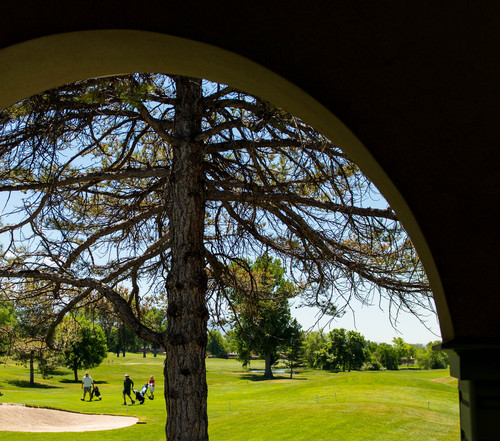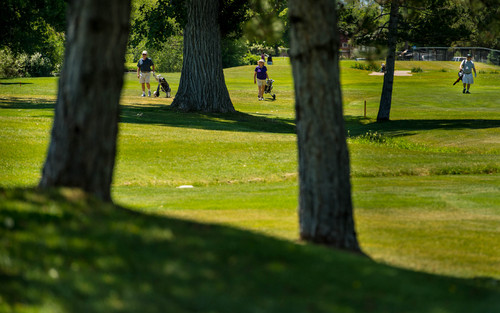This is an archived article that was published on sltrib.com in 2014, and information in the article may be outdated. It is provided only for personal research purposes and may not be reprinted.
As Salt Lake City works to get its troubled golf system out of the financial rough, it will have to do more than just close a west-side par 3 course.
The City Council faces a litany of tough choices that could include closing other courses that are not dependable moneymakers.
The council's Tuesday work session agenda tees up options aimed at reshaping the city's eight-course system that is, by all accounts, financially unsustainable.
The Bonneville Golf Course and the two sets of links at Mountain Dell are consistent winners, according to city officials, and appear safe from closure or modification. Nibley must remain a golf course, according to a 1922 agreement between the city and the Nibley family, which donated the land.
But, according to Council Chairman Charlie Luke, everything else is "on the table."
The council's ad hoc golf subcommittee has identified three scenarios that could close one or more of the following courses: Wingpointe, Forest Dale and Glendale.
The council already has determined to close the Jordan River Par 3 at the end of this golf season.
The Golf Enterprise Fund is expected to lose $500,000 this season, putting it $1 million in the red after a similar performance last year. Further, the fund's annual revenues of about $8 million have left about $23 million in deferred maintenance across the system over the past decade or more.
The city's system also faces a national trend characterized by an overall decline in rounds of golf played each year.
Nonetheless, golfers interviewed at Forest Dale and Glendale seemed dumbfounded at suggestions that courses be closed.
—
'Crazy' • "We've been playing this course for 40 years," said Forest Dale regular Lavar Rueckert. "Closing it would be ridiculous."
"It's crazy," said Wayne Cederholm,another Forest Dale fan. "I don't think it's a good idea to close any of the courses."
Earlier this week, the council got an earful from about 100 Rose Park residents who descended on a City Hall public hearing to admonish the council not to change the 18-hole Rose Park Golf Course.
Among myriad suggestions outlined in a 209-page report from the National Golf Foundation is that Rose Park could be reconfigured into a so-called "executive course," which could mean a shortened nine-hole design.
The council knows that any decision it makes to reduce golf courses would have critics, said Councilwoman Lisa Adams, who is a member of the golf subcommittee. "We are prepared to have people upset with us. Nobody will be happy with these solutions."
But Adams noted that the time is past to hope "Band-Aids" will solve the problems facing the golf program.
"There is real passion about the city's golf courses, and it gives us heartburn to have to do it," she said. "But doing nothing is not an option. ... The longer we delay, the harder it gets."
Much of the deferred maintenance surrounds aging irrigation systems, clubhouses and restrooms, said Councilman Kyle LaMalfa, who noted that various city departments have been seeking solutions for years.
"We've been kicking the can down the road for a long time because it has been difficult for a long time," he said. "When it comes to how do we save golf — it will take a variety of things."
—
Crunch time • Whether the council reaches consensus on any of the potential closures remains to be seen, but Chairman Luke, like LaMalfa and Adams, said he is unwilling to put off major decisions for another year.
"I really hope we can get some sort of idea where we go," he said of the council's Tuesday work session. "My goal is that any decision we make will be justifiable."
But justifying course closures to Salt Lake City golfers may be difficult.
"It would be heartbreaking for me," said Mary Templeman," who often plays Forest Dale. "I can't imagine not having public golf courses."
Fred Fogo believes the council should look at other ways to raise revenue. He likes to play a variety of courses, including Glendale, Rose Park and Wingpointe.
"If there are money problems, I don't see why a little subsidy [from the city's general fund] shouldn't be made," Fogo said. "And if they want to raise green fees a little, I'd be OK with that. We are very reasonable compared to most markets."
Michael King agrees. The Salt Laker plays many of the city courses regularly and often golfs in Oregon, Washington and Canada, where, he said, fees are about twice as much.
"Public golfing is a very good value in Salt Lake City," he said. "And the courses are good public amenities."
The consultant's report did suggest raising some green fees.
But there appears to be little support among city officials to tap the general fund to support golf.
And while the report did identify some golf course lands that could be sold, there is no appetite among council members to sell courses for commercial use.
One proposal cited by several council members would be to buy any closed course with money from the general fund to be maintained as a park or open space.
Council members should take a slow deliberative approach when considering course closures or modifications, said Councilman Luke Garrott.
"I don't see us making any big decisions like closing courses [Tuesday]," he said. "I'm under the impression it will take at least six months — it will be a drawn-out decision."
Salt Lake City Council
The council's work session is scheduled Tuesday beginning at noon in City Hall, 451 S. State, Room 326. The meeting is for discussion among council members. Although the public is invited, public comment is not accepted. However, the council's formal 7 p.m. meeting includes a public-comment period. That meeting is held in Room 315. Residents also can make comments on city's online Open City Hall http://www.slcgov.com.









